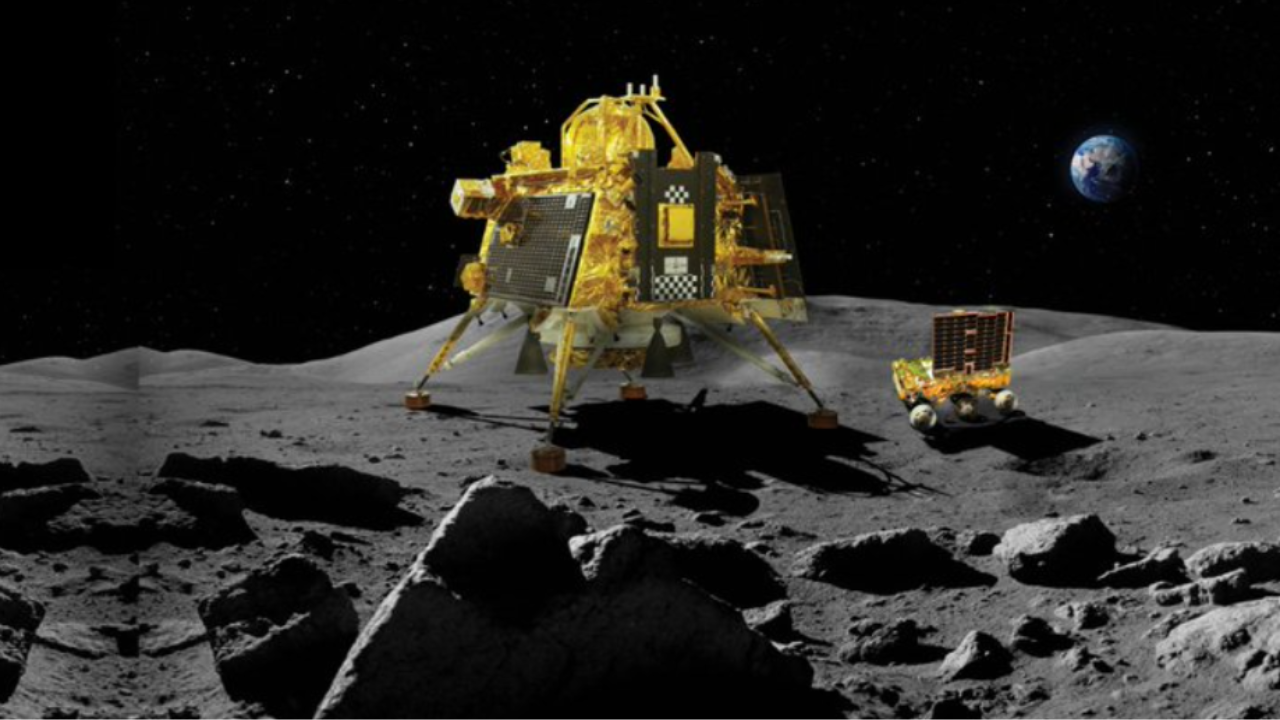Though the lander of Chandrayaan-2 mission was lost, PRADAN, the orbiter, is currently in a 100 km x 100 km orbit around the Moon.
In a post on X (formerly Twitter), Isro said the orbiter sent a welcome message to Chandrayaan-3’s lander module, comprising lander Vikram and rover Pragyan.
“‘Welcome, buddy!’ Ch-2 orbiter formally welcomed Ch-3 LM. Two-way communication between the two is established,” the space agency said in its post.
With the stage set for landing, Isro will now be carrying out internal checks on the landing module. Powered descent is expected to commence on August 23 at around 5.45pm and Vikram is set to land on the lunar surface around 6.04pm.
Vikram sends pictures of Moon’s far side
Earlier in the day, Isro released pictures of the far side of the Moon — the lunar hemisphere that always faces away from Earth.
“The Lunar far side area was captured by the Lander Hazard Detection and Avoidance Camera. This camera that assists in locating a safe landing area — without boulders or deep trenches — during the descent is developed by Satellite Application Centre,” Isro said.
All four photos shared by Isro were taken on August 19, a day before Vikram entered the pre-landing orbit.
Landing planned during Moon’s sunrise
Explaining why the landing has been planned on the day the Sun rises on the Moon, Isro chairman S Somanath had said: “We want the landing to happen when the Sun rises on the Moon so we get 14-15 [Earth] days to work. If landing cannot happen on the first two days (Sun rise and the next day) we’ll wait for another month and land in September.”
Vikram and Pragyan (the rover) are designed to have a life of one lunar day (14 Earth days) powered by the Sun, but a life extension is not ruled out completely.
According to Somanath: “Once the Sun sets, there will be no power for the lander and rover to function and all the equipment will stop working. However, our tests show that there are possibilities of the battery getting recharged upon the next Sun rise. If that happens, we could get another 14 days or maybe even more.”
Upon a successful landing, Pragyan will slide down from Vikram — which will be captured by cameras on the lander — and begin to move on the lunar surface using its wheels. Pragyan is also equipped with cameras for obstacle avoidance.
New space race
A successful soft landing on the moon will make India only the fourth country in the world to achieve the feat after the United States, Russia and China.
India will also become the first country to land on the lunar south pole.
Russia had been racing against India, and more broadly against China and the United States which both have advanced lunar ambitions, to land on the Moon’s south pole, which is of special interest to scientists because of the occurrence of water ice that could play a vital role in future human exploration missions.
Russia’s Luna-25 craft, however, crashed into the Moon after a glitch and spinning into an uncontrolled orbit.
There are at least 10 other lunar missions planned between now and 2025, with the US, Israel, China and Japan — including a joint mission with India — all going to Moon.
The US will launch its CLPS (Commercial Lunar Payload Services), Trailblazer, VIPER (Volatiles Investigating Polar Exploration Rover) and Artemis-II, China has multiple missions under the China’s Lunar Exploration Programme, Israel is planning Beresheet-2 and Japan will launch Hakuto-II & III and SLIM (Smart Lander for Investigating Moon) independently, and Lupex (Lunar Polar Exploration) jointly with India.
These missions are part of a renewed interest globally to return to Moon and efforts for a more sustained presence.
(With inputs from agencies)
Watch Chandrayaan-3: With just 2 days away from landing, ISRO’s Vikram sends rare images of moon’s South Pole


